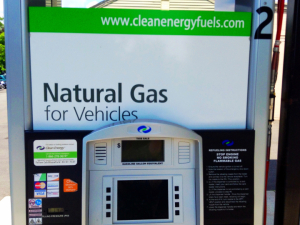What’s not to like about U.S. produced fuel that’s affordable, better for the environment and readily available?
The producers of BYUradio's "Top of Mind with Julie Rose," a daily, live news talk and interview show, liked the idea of a catalyst for natural gas vehicles so much that they featured Michael Harold, the M.D. Anderson Professor and chair of the chemical and biomolecular engineering department at the University of Houston, on a recent episode.
The show reaches a national audience of Brigham Young University alumni and affiliates, as well as satellite radio subscribers looking for smart, informative, and uplifting radio content.
Harold, who is an expert in catalytic reaction engineering, is leading a team chosen by the U.S. Department of Energy for a $2 million project to develop and optimize a lower-cost, more efficient catalyst to eliminate unreacted methane.
Other members of the research team include: Lars Grabow, associate professor of chemical and biomolecular engineering at UH, and researchers from the Oak Ridge National Laboratory, the University of Virginia and CDTi Inc., an emissions technology company based in Oxnard, Calif.
Traditional vehicle exhaust catalysts rely on platinum, palladium and rhodium, which are effective but expensive.
The team is working on a “four-way catalyst,” building on the three-way catalysts used with gasoline and diesel engines. A critical aspect of the project is to reduce the use of precious metals, lowering the cost.
The new catalyst will test the use of metal oxides containing lower-cost elements iron, cobalt, copper, manganese, nickel and others.
“We’re working on something that’s important for the country,” Harold said. “We have a surplus of natural gas, and we are helping break down barriers for its expanded use.”
